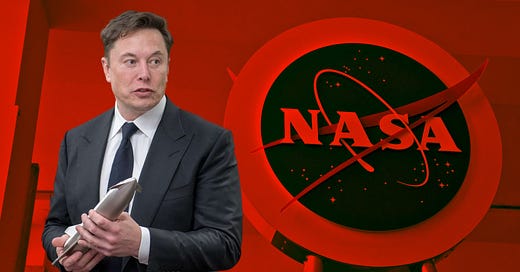How Elon Musk plans to upend NASA
The SpaceX CEO wants to overhaul the space agency for his company’s benefit
After tearing its way through the US government, Elon Musk’s Department of Government Efficiency (or DOGE) is headed to the National Aeronautics and Space Administration — the source of about $15 billion of SpaceX’s public contracts. Musk may want to see humanity become a multiplanetary species, but that doesn’t mean he necessarily sees NASA as an ally in that mission.
On February 12, NASA acting administrator Janet Petro said that DOGE was going to look over the agency’s books and that hundreds of the agency’s staff had already accepted a buyout to leave the federal government. NASA has begun removing pronouns from workers’ emails and gutting diversity programs, in line with orders from the Trump administration. In an internal email less than a week earlier, Petro acknowledged that the changes were “weighing on many of you” but asked workers to take “some inspiration” from DOGE’s calls for efficiency.
It should come as no surprise that there are concerns about what Elon Musk plans to do with NASA given the power he’s seized over the US federal government. The ranking members of the Congressional committees dealing with space and science have already sent a letter to Petro expressing concern about Musk’s conflicts of interests and the potential for sensitive NASA data to be accessed by people who run SpaceX, but that’s unlikely to stop DOGE.
Despite relying so much on NASA for SpaceX contracts, Musk wants to transform the agency and better align it with his own priorities. Donald Trump nominated Jared Isaacman as its new administrator, a billionaire who’s paid for two private trips on SpaceX rockets. Isaacman is poised to help Musk achieve his vision and make sure the US space program becomes more dependent on his company.
The Moon or Mars?
During Trump’s first term in office, he directed NASA to return to the Moon and begin preparing for a mission to Mars to follow it as part of the Artemis program. The first crewed Artemis mission is poised to land on the Moon in mid-2027, marking the first time humans will have been there since 1972. But that’s not good enough for Musk. In December, he criticized Artemis as “a jobs-maximizing program, not a results-maximizing program.” Then, in January, he asserted, “we’re going straight to Mars. The moon is a distraction.”
Musk may have a lot of influence in the Trump administration, but that doesn’t necessarily mean the Moon mission is dead. Trump likely wants to be able to preside over the return of astronauts to the moon for the first time in decades, just as he was able to be on hand for the first crewed rocket launch from American soil in nine years during his first term. The United States also doesn’t want China to beat it to the moon, as it has plans for its own mission by 2030.
Isaacman seems aligned with that vision. “With the support of President Trump, I can promise you this: We will never again lose our ability to journey to the stars and never settle for second place,” he wrote on Twitter/X after his nomination. “Americans will walk on the Moon and Mars and in doing so, we will make life better here on Earth.” But that doesn’t mean he’s off side with Musk either.
While he might prefer a focus on Mars, the SpaceX CEO and head of DOGE has his eye on a much bigger prize. He may get a greater priority placed on the mission to Mars, but what he really wants is to completely upend how the US space program currently operates — a transformation that would further enhance the country’s dependence on SpaceX and his ability to set its priorities.
Fighting for public contracts
NASA has long understood that to maintain its funding, it needed to keep lawmakers happy. For that reason, it has facilities in many parts of the United States and its contractors ensure production is widely distributed as well. For example, the Space Launch System (SLS) is responsible for 28,000 jobs across 44 US states, making it so many Congresspeople will defend the agency and its funding to avoid the risk of losing the work being done in their jurisdictions.
However, that model is not one that prizes efficiency. NASA often relies on cost-plus contracts where it lays out what it’s looking for then pays traditional aerospace companies the associated development costs and an agreed amount for profit. But that model has been known to produce long delays and have budgets increasing far beyond initial forecasts. For example, sections of the SLS have experienced billions of dollars in cost overruns, while the James Webb Space Telescope ballooned from a few billion dollars to $10 billion and launched more than a decade late.
The Obama administration already started to change things at NASA. During his tenure, he canceled the Constellation program and opened the doors to private space companies like SpaceX. At the time, Musk celebrated those moves — but now he wants to see things go even further.
Musk has a long history of criticizing the SLS, whose development is led by Boeing, even saying it “makes me feel sad.” Isaacman has called it “outrageously expensive,” and criticized NASA’s decision to give Blue Origin a contract for a second lunar lander. The duo have a number of programs in their sights, but the SLS seems most central, whether it’s for cancelation or to be phased out in the coming years to leave the door open to an alternative provided by SpaceX. That gets to the deeper transformation Musk, Isaacman, and many others in this new wave of defense and aerospace companies want to see.
The Silicon Valley billionaires remaking the US government want to end the cozy relationship between branches of the federal government like NASA and the Department of Defense and traditional contractors like Boeing, Lockheed Martin, and Northrop Grumman. They’ll promise to do things more efficiently and at lower cost, but more than anything they want a much larger share of the billions of dollars that flow from government to private contractors for defense and aerospace technology.
Last year, venture capitalists Marc Andreessen and Ben Horowitz said as much in their Little Tech Agenda, calling for the government to stop favoring large incumbents for defense contracts in favor of those associated with the modern tech industry. Palantir CTO Shyam Sankar went even further, calling the Department of Defense a communist organization that defended traditional military contractors. He’s demanding a “reformation” of defense spending to allow more private-sector competition, which would mean more contracts for SpaceX, Palantir, and Anduril instead of Boeing, Lockheed, and Northrop.
Putting SpaceX first
The effort to remake NASA is part of a larger transformation happening in the tech industry. After years, if not decades, of wanting the public to see Silicon Valley as hostile toward government, tech executives are quickly reversing course — not just to cozy up to the Trump administration, but to get access to a much greater flow of public funds for defense tech and AI military applications. Musk may be the most visible face of that effort, but he’s far from the only one.
Given how fast DOGE and the Trump administration have been tearing through the federal government, the changes at NASA could come fast too. SpaceX recently got even more money from the agency, while Boeing warned that 400 of the 800 workers it employs to work on the Artemis program could be laid off in the coming months. Musk does not want to see the United States turn its ambitions away from the stars; he just wants to see his own priorities adopted as those of the entire nation.









Can we just agree to give them Mars. They can go there and rule the whole planet and do their government efficiency there.
So Musk is basically speedrunning NASA’s transformation into a SpaceX subsidiary. Wild how public space exploration is turning into a billionaire’s playground. Efficiency is great, but at what point does 'streamlining' just mean shifting control from government to one dude with a rocket obsession? Great article btw, Paris.